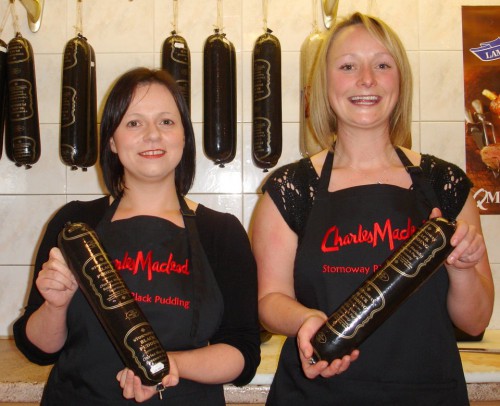STORNOWAY Black Pudding will get official legal protection against rip-offs in the next fortnight, a government minister has revealed.
The Western Isles delicacy will enjoy the same status as Arbroath Smokies, meaning the name can only be used by four butchers within a five-mile radius of Stornoway.
Rural Affairs Secretary Richard Lochhead said he “expected” Stornoway Black Pudding to be added to European list of Protected Food Names within days.

He said the ruling should be in place by mid-February, making it illegal for firms elsewhere to refer to their own creations as “Stornoway” or even “Stornoway-like”.
The victory follows four years of campaigning by Stornoway butchers and their supporters for the coveted status.
The imminent victory was revealed in the reply to a Parliamentary question asked by Highlands & Islands Labour MSP Rhoda Grant.
Asked when Protected Geographical Indicator status (PGI) was expected, Mr Lochhead replied: “PGI for Stornoway Black Pudding is expected to be granted around the end of January/mid February 2013.
“The EU wide consultation ended on 15 December following which the Commission will start making arrangements for the name to be added to the register of EU protected food names.
“Due to the administrative procedures including translation in the EU community languages this takes a further six to eight weeks before publication of the registered name in the EU Official Journal.”
Stornoway Black Pudding – marag dubh in gaelic – typically contains onions, suet, oatmeal and spices alongside blood and fat.
Rivals
A 1.3kg pudding typically costs around £7.80.
Sneaky rivals of Stornoway butchers were found to be adding other ingredients such as bacon and rice while exploiting the revered brand.
Mr Lochhead, the SNP MSP for Moray, added: “It is important that people know where their food comes from and this certification gives customers from home and abroad the guarantee that what they are buying is the genuine product, made to the consistently high levels of quality they expect.”
During the campaign, Iain Macleod, of Stornoway butchers Charles Macleod, said: “Attaining PGI status is a priority, as it protects the consumer from being misled about the provenance and quality of Stornoway Black Pudding, while safeguarding our regional food heritage.
“It will provide customers with the assurance that what they are buying is the genuine article, made in our region to the consistently high levels of quality and using the traditional crofting recipe.
“The process is a lengthy one but worthwhile, and we believe that it will bring vital economic benefits to the area.”
Donnie Morrison from the Stornoway Black Pudding Producers Association described the news as a “milestone” for butchers.
He said: “It has been a long, hard-fought journey and we have been so encouraged by the support that we have received.
“With no formal objections having been raised at either UK or European level, we are quietly optimistic of a positive result, which is of importance not only to our own businesses, but to the wellbeing of the economy in the Outer Hebrides.”
Other food products that were awarded PGI status include Melton Mowbray pork pies and Champagne as well as famous Scottish names such as Orkney Lamb, Scotch Beef and Cornish Clotted Cream.
In 2010 Scotch Whisky was also given greater legal protection in China where Asian firms were selling their own alcohol with the “Scotch” brand – the ruling meant it could only be sold in China according to UK rules.
Just last week the seriousness of breaching the rules was highlighted when Li Cuihong, from western China, was caught selling Chinese spirits with artificial flavouring labelled as Scotch whisky.
He was sentenced to four years in prison and fined £50,000.
The Scotch Whisky Association (SWA) described the decision as a “major success” for its legal protection work.